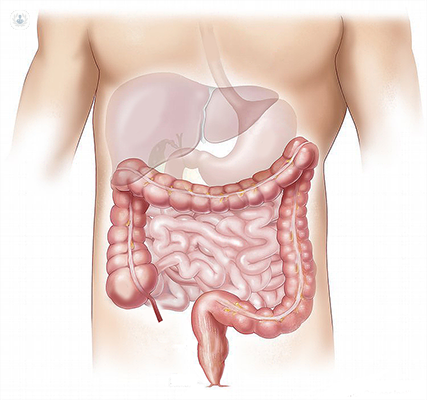


What is bowel cancer screening?
Screening aims to determine whether healthy people show any early signs of bowel cancer. Bowel cancer is a common form of cancer for men and women, with approximately 1 in 20 people experiencing it in their lifetime in the UK. Detecting early signs of risk for bowel cancer can ultimately save lives. Bowel cancer in its early stages is more likely to be treated successfully.
What does bowel cancer screening involve?
In the UK, people over the age of 60 are invited to be screened. Following this, you are invited every two years for screening until the age of 75. Screening involves home tests that detect blood in the stool. If you are registered with a GP in the UK, you will automatically be sent this home test after the age of 60.

Additionally, at age 55 you are invited for a one-off bowel scope screening test (also known as a flexible sigmoidoscopy) where a thin tube with a camera is used to examine the inside of the bowel. This test can detect polyps, which are small growths that could eventually turn into cancer. If polyps are detected, they can be removed.
Why is bowel cancer screening done?
Bowel cancer screening is offered because it can save lives by detecting early signs of bowel cancer, or your possible risk of developing it. The earlier it is detected, the more successful treatment is likely to be.
Preparation for bowel cancer screening:
For the bowel scope screening, a few weeks before the appointment you will be sent a small plastic pouch containing liquid to perform an enema before the test, as well as instructions on how to do this. On the day of the test you will need to use the enema kit. This will induce a bowel movement before the test. You will also need to wear a hospital gown for the test.
For the home test kit, no preparation is required.
What to expect during bowel cancer screening:
During a bowel scope screening, the camera tube is inserted gently into your bottom to check for polyps. This test is painless, but you might find it slightly uncomfortable. No anaesthesia is required. The test lasts just a few minutes and you return home soon after the test is finished.
The home test kit is for sending a small poo sample to be tested in a laboratory. You will receive instructions on how to take a stool sample with the kit.
What do abnormal results mean?
Following the bowel scope test, if polyps are found you are told immediately following the test. If polyps are found and removed but are not cancerous you might also be offered a colonoscopy to check for polyps elsewhere in the bowel. If cancerous polyps are found and removed, you will be referred to a bowel cancer specialist to discuss treatment.
A normal result from a home test kit would indicate no blood in your stool, with no further action required other than another home test kit in two years’ time. If blood is found in your stool sample you will be offered a colonoscopy to do a more thorough investigation.